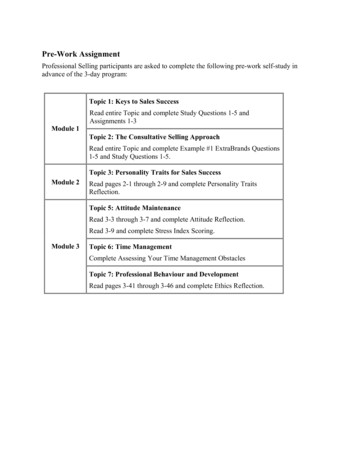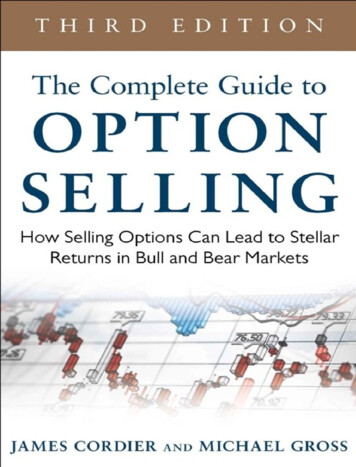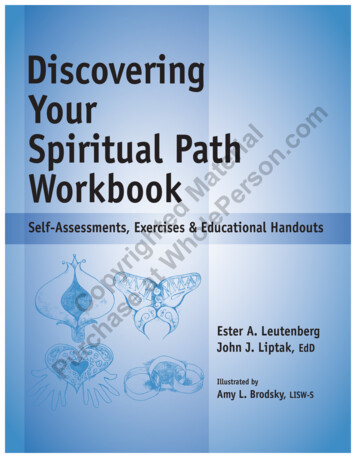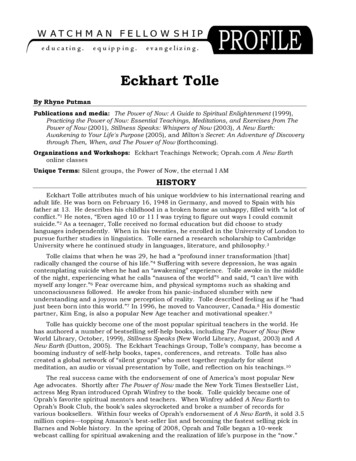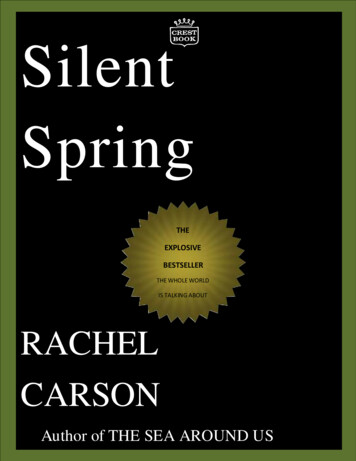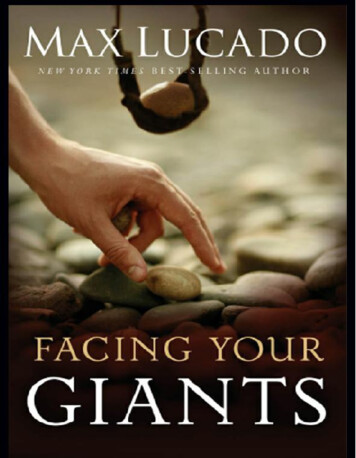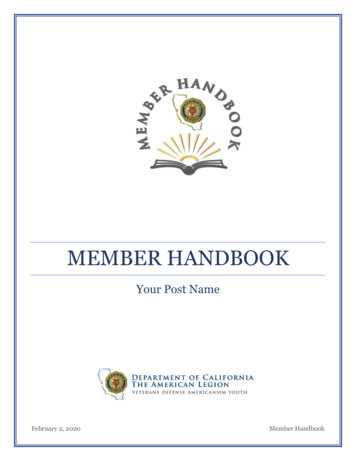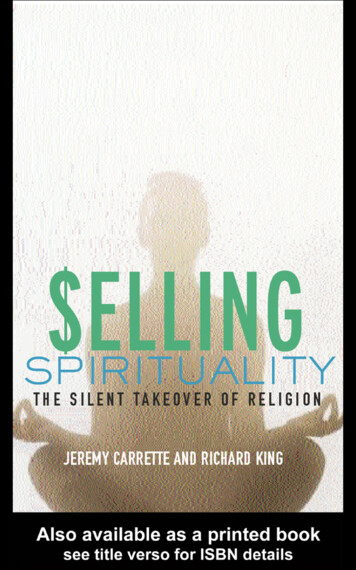
Transcription
SellingSpiritualityFrom feng shui to holistic medicine, from aromatherapy candles to yoga weekends,spirituality is big business. It promises to soothe away the angst of modern living, andto offer an antidote to shallow materialism. Selling Spirituality is a short, sharp attackon this fallacy.It shows how spirituality has in fact become a powerful commodity in the globalmarketplace – a cultural addiction that reflects orthodox politics, curbs self-expressionand colonises Eastern beliefs. Exposing how spirituality has today come to embody theprivatisation of religion in the modern West, Jeremy Carrette and Richard King revealthe people and brands who profit from this corporate hijack, and explore how spirituality can be reconfigured as a means of resistance to capitalism and its deceptions.Jeremy Carrette teaches at the University of Kent at Canterbury, UK, and wasformerly Head of Religious Studies at the University of Stirling, and is author ofFoucault and Religion (2000). Richard King is a scholar of Indian philosophy and religionand has taught in several British universities. He is the author of three previous booksincluding Orientalism and Religion (1999) and currently lives and writes in Paris.
JEREMY CARRETTEAND RICHARD KINGSellingSpiritualityThe silent takeoverof religion
First published 2005by Routledge2 Park Square, Milton Park, Abingdon, Oxfordshire, OX14 4RNSimultaneously published in the USA and Canadaby Routledge270 Madison Avenue, New York, NY 10016Routledge is an imprint of the Taylor & Francis GroupThis edition published in the Taylor & Francis e-Library, 2004. 2005 Jeremy Carrette and Richard KingAll rights reserved. No part of this book may be reprinted orreproduced or utilised in any form or by any electronic, mechanical,or other means, now known or hereafter invented, includingphotocopying and recording, or in any information storage orretrieval system, without permission in writing from the publishers.British Library Cataloguing in Publication DataA catalogue record for this book is available from the British LibraryLibrary of Congress Cataloging in Publication DataCarrette, Jeremy R.Selling spirituality : the silent takeover of religion /Jeremy Carrette and Richard King.—1st ed.Includes bibliographical references and index.1. Spiritual life. I. King, Richard, 1966– II. Title.BL624.C3475 2004204—dc222004005324ISBN 0-203-49487-3 Master e-book ISBNISBN 0-203-57283-1 (Adobe eReader Format)ISBN 0–415–30208–0 (hbk)ISBN 0–415–30209–9 (pbk)
For Florence, Cécile, and Lila
ContentsAcknowledgementsixIntroduction: Spirituality and the Rebranding of Religion11: A Brief History of Spirituality302: Western Psychology and the Politics of Spirituality543: Spirituality and the Privatisation of Asian WisdomTraditions874: Selling the Soul: The Business of Spirituality123Conclusion: Spirituality and Resistance: Challengingthe corporate takeover169ReferencesIndex183189
AcknowledgementsAnd it is possible that, in the realm of human destiny, the depth of man’squestioning is more important than his answers.André Malraux, Anti-Memoirs [1967], Penguin, 1970, p. 15This book emerged out of a profound discomfort with the wayin which neoliberalism, ostensibly a capitalist economic theoryemerging in the late twentieth century, is being presented to the postCold War world as the only way forward in an age of globalisation. It isa response to the increasing encroachment of the ideology of ‘marketforces’ and utilitarian efficiency into all aspects of human culture andthought (what one might call the marketisation or commodificationof life itself). It is part of the broader argument of this book that thisprocess, precipitated by the unfettering of global financial marketsin the late twentieth century, is increasingly framing the very groundsof cultural expression itself – in most cases without the consciousknowledge or consent of society as a whole. This is the silent takeover that we are attempting to expose within this work. The bookoriginally arose from a series of conversations emerging from theauthors’ wider academic work in the history of religious ideas and ispart of an ongoing conversation. As such, it brings together insightsfrom cultural and social theory, the history of psychology, the studyof Asian philosophies, postcolonial theory and our mutual interest inthe politics of knowledge. While working on our respective long-termacademic projects, both authors became fascinated by the explosionof literature on spirituality, not only in the ‘mind, body, and spirit’section of bookstores but also in the various professions. Initiallythis book was going to be a critical introduction to that concept, butincreasingly over a year of meetings it came to take on a more directpolitical edge. In the attempt to speak to a wider audience we havedeliberately sought to approach the topic through a more accessiblegenre than traditional academic monographs. The book seeks to raisea series of questions in a narrative style that is more open-ended and
xAcknowledgementsprovocative than traditional academic discourse normally allows. It iswritten in the spirit of the French popular essai and hopes to speak towider political concerns and constituencies than are usually appealedto in scholarly works.Selling Spirituality examines the growing commercialisation of‘religion’ in the form of the popular notion of ‘spirituality’, as it isfound in education, health-care, counselling, business training,management theory and marketing. The analysis offered is but oneexample of the way in which the ‘market mentality’ is now infiltratingall aspects of human cultural expression in (so-called) ‘advanced’capitalist societies. The book provides a critical philosophical discussion of issues arising from this contemporary cultural shift in relationto the spheres of religion and spirituality, but does not attempt toprovide an exhaustive overview of the various groups and literatureconcerned. Rather, the book seeks to address the politics of knowledgesurrounding the idea of spirituality and draw attention to the pernicious social effects of neoliberalism and the corporate takeover ofsociety that such shifts represent. The work is an explicitly politicalproject in that it seeks to challenge the commodification of life as wellas disrupt the domestication of diverse cultural traditions, practicesand communities in terms of an increasingly homogenised, sanitisedand socially pacifying conception of spirituality. In writing such abook, we hope to raise awareness of the ways in which popular discourses about ‘spirituality’ tend to displace questions of social justice,being increasingly framed by the individualist and corporatist valuesof a consumer society.We would like to thank a number of people for supporting thisproject. In particular, Roger Thorp, then Routledge commissioningeditor for religion in the UK, for trusting us enough to make thisproject a viable concern, and Clare Johnson for following it throughits various stages. We would also like to thank John I’Anson ofthe Department of Education at Stirling University for providingreferences to material on education and spirituality. Richard wouldlike to make special mention of the University of Derby, UK, formaking him personally aware of the effects of market forces in theworkplace and for providing a case study of the transformation of
Acknowledgements xiuniversity education into a retail enterprise. We would like to thankRichard Roberts and two anonymous reviewers for their constructiveand critical comments, Wendy Pearce for useful references on businessand spirituality and Jude and Richard Fox for useful clarifications.Jeremy would like to thank Ron McKechnie and the New Directionsin the Study of Alcohol Group for inviting him to speak at the 25thAnnual Conference in Dumfries, Scotland, in April 2001, on the topicof spirituality and addiction, which formed the basis for some of thework. Such an event provided rich insights into the increasing use ofspirituality by healthcare practitioners and was a creative forum forexploring the issues. We would also like to thank Tim Carrette forengaging us with his understanding of the value of ‘spirituality’ andfor challenging our own political reading of the material. We hopethat we have refined our arguments sufficiently in the light of yourquestions. Thanks also to Vicki Clifford for letting Jeremy use hercottage to finish his writing and to Paulette and Jean-Claude Faucherfor providing Richard and Florence with a home, a place to work andplenty of good food and Bordeaux wine, both in Paris and Le Teich. Aspecial thanks to Paulette for access to her private collection of bookson spirituality.This book was written intermittently during a year of enormouschange in the personal and political spaces of our lives and reflectsmany enjoyable weekends in Derby, Paris and Edinburgh. Jeremywould like to thank Cécile for all her love and magical times togetherin Paris, London and Worcester College, Oxford, which have foreverchanged his life. Thanks to Florence for making it possible for‘strangers to meet in the night’ and Anne-Marie for providing uswith a place for ‘dancing in the rain’ until we found our own home.Richard would like to thank Florence for her love and support, particularly through the last three years of breathtaking change and stressin both of their lives, and for enriching his life with her love, smileand companionship. Both authors wish to express their gratitude toFlorence not only for her friendship but also for her critical acumen inreading and commenting on various drafts of this work. If this booksucceeds in being accessible at all, that is a testament to Florence’scareful proofreading. Thanks also to little Lila for reminding her father
xii Acknowledgementsof the importance of changing nappies and giving cuddles as well astaking a stand for the sake of future generations.Jeremy Carrette and Richard King,February 2004
Spirituality and the Rebranding of ReligionIntroductionGod is dead but has been resurrected as ‘Capital’.From feng shui to holistic medicine, from aromatherapy candles toyoga weekends, from Christian mystics to New Age gurus, spiritualityis big business. There has been an explosion of interest and popularliterature on mind, body and spirit and ‘personal development’. Wenow see the introduction of modes of ‘spirituality’ into educationalcurricula, bereavement and addiction counselling, psychotherapy andnursing. Spirituality as a cultural trope has also been appropriated bycorporate bodies and management consultants to promote efficiency,extend markets and maintain a leading edge in a fast-moving information economy. For many people, spirituality has replaced religion asold allegiances and social identities are transformed by modernity.However, in a context of individualism and erosion of traditionalcommunity allegiances, ‘spirituality’ has become a new cultural addiction and a claimed panacea for the angst of modern living. Spiritualityis celebrated by those who are disillusioned by traditional institutionalreligions and seen as a force for wholeness, healing and inner transformation. In this sense spirituality is taken to denote the positiveaspects of the ancient religious traditions, unencumbered by the ‘deadhand’ of the Church, and yet something which provides a liberationand solace in an otherwise meaningless world. But is this emergenceof the idea of spirituality all that it seems? Is something more complexand suspicious at work in the glorification of the spiritual?To contest some of the dominant readings of ‘spirituality’ withinwestern societies and their silencing of traditions will require someexamination of how these discourses operate in the contemporarysocio-economic world. This book emerges from a frustration with thelack of clarity and critical discussion of the concept of spirituality,a notion that has become pervasive in contemporary society in the
2Selling Spiritualityconsciousness of its advocates and its detractors. The concept thereforerepresents on the one hand all that is banal and vague about New Agereligiosity, while on the other signifying a transcendent quality,enhancing life and distilling all that is positive from the ‘ageing andoutdated’ casks of traditional religious institutions.This book attempts to uncover what amounts to a silent takeover of‘the religious’ by contemporary capitalist ideologies by means of theincreasingly popular discourse of ‘spirituality’. We seek to challengethe contemporary use of this concept as a means of reflecting andsupporting social and economic policies geared towards the neoliberal ideals of privatisation and corporatisation, applied increasinglyto all spheres of human life.QUESTIONING MODERN SPIRITUALITYWhat is neoliberalism and what exactly does it have to do withspirituality?Neoliberalism is the defining political economic paradigm of our time –it refers to the policies and processes whereby a relative handful ofprivate interests are permitted to control as much as possible of sociallife in order to maximise their personal profit. Associated initially withReagan and Thatcher, neoliberalism has for the past two decades beenthe dominant global political economic trend adopted by politicalparties of the center, much of the traditional left, and the right. Theseparties and the policies they enact represent the immediate interestsof extremely wealthy investors and less than one thousand largecorporations.(McChesney, 1999: 8)For many, spirituality would seem to have little to do with questionsof economics and politics. The roots of this modern attitude go backto eighteenth century European thought (the Enlightenment), wherethe underlying principles of liberalism were born. In challenging thetraditional social, moral and philosophical authority of the Church,European intellectuals sought to establish a framework for societyand politics that avoided the religious conflicts of previous centuries.The solution, outlined most notably by philosophers such as John
Introduction: The Rebranding of Religion 3Locke, was to relegate the religious to the private sphere of life – toclearly demarcate it from the public realms of politics, science andphilosophy.The Enlightenment is also a period characterised by attempts todefine the specificity of these different aspects of cultural life. This ledto an intellectual obsession with defining the precise characteristicsof religion (a preoccupation that continues to this day). This is amisleading enterprise because it takes conceptual distinctions with aspecific history of their own and treats them as if they are features ofthe world rather than of a culturally specific way of understanding it. Itis clear for instance that it makes little sense to draw a sharp distinctionbetween the secular (politics, economics, science, philosophy) andthe religious dimensions of human life in any other culture than thoseconditioned by modern liberalism and the European Enlightenmentphilosophies of the eighteenth century. We should also make ourposition on this question clear from the start: There is no essence or definitivemeaning to terms like spirituality or religion. The attraction of defining anessence is that it clearly demarcates a field for the purposes of analysis.Such a move, however, leaves the impression that spirituality is somehow really divorced from other spheres of human life such as economics, culture and politics. The desire to attribute a universal essence tothe meaning of spirituality also ignores the historical and culturaltraces and differences in the uses of the term. Searching for an overarching definition of ‘spirituality’ only ends up missing the specifichistorical location of each use of the term. There is no view fromnowhere – no Archimedian point outside of history – from whichone could determine a fixed and universal meaning for the term‘spirituality’.This book seeks to shift debate about religion and spirituality awayfrom a misleading emphasis upon truth and authenticity (‘Whatcounts as real spirituality?’) towards a consideration of the sociopolitical consequences of such claims (‘Who benefits from particularconstructions of “spirituality”?’). Our approach is to pay attention,following William James, to the ‘fruits not the roots’ of contemporaryuses of the term. What are the socio-political effects of the decisionto classify specific practices or philosophies as ‘spiritual’ and who
4Selling Spiritualitybenefits from such constructions? However, where we differ fromJames – a primary exponent of a psychological definition of religiousexperience – is in wishing to displace the individualisation of thespiritual, since it is precisely this which has allowed consumerist andcapitalist spiritualities to emerge in the late twentieth century.There are two features of this relatively new phenomenon thatwe seek to contest. First, we wish to challenge constructions ofspirituality that promote the subsuming of the ethical and thereligious in terms of an overriding economic agenda. We do not dothis out of some attempt to privilege some pure realm known as ‘thereligious’ or ‘the spiritual’ and separate it from apparently ‘worldly’concerns. In our view there is no distinct realm known as ‘thereligious’ that exists in isolation from the social, political and economic world (King, 1999a; Carrette, 2000). This is not to reduce ‘thereligious’ out of existence but to refuse to isolate it from those otherdimensions of human life (except for the purposes of analysis). Theremay be no pure homo religiosus but there is also no homo oeconomicus,despite the increasing dominance of the economic as an apparentindicator of fundamental human motivation and action.Those traditions classified as ‘religions’ in the modern consciousness have always been bound up with economics and modes ofexchange. However, a fundamental ground shift has taken place inAmerican and British culture in the last twenty years, related to thederegulation of the markets by Ronald Reagan and Margaret Thatcherin the 1980s, and this is changing the relationship of cultural formsto the market. With the development of organisations like the WorldTrade Organisation (WTO) and the emergence of neoliberalismas the dominant economic ideology of our time, this cultural andpolitical shift has already gone global. With the emergence of capitalistspirituality we are seeing an attempted takeover by a specific economic agenda of the cultural space traditionally inhabited by ‘thereligions’. Entering public institutions that provide education, healthcare and professional expertise within society as a whole, the ideologies of consumerism and business enterprise are now infiltratingmore and more aspects of our lives. The result of this shift has been anerasure of the wider social and ethical concerns associated with
Introduction: The Rebranding of Religion 5religious traditions and communities and the subordination of ‘thereligious’ and the ethical to the realm of economics, which is nowrapidly replacing science (just as science replaced theology in aprevious era), as the dominant mode of authoritative discourse withinsociety.This represents the second feature of ‘The danger is that religion coulddominant conceptions of spirituality become no more than a serviceto the global civilization,that we wish to challenge and this is sectorno longer shaping its valuestheir essentially accommodationist but merely repairing the spiritualorientation. In a sense, the most damage it inflicts.’Cox, ‘Christianity’, in Marktroubling aspect of many modern HarveyJuergensmeyer (ed.), Global Religions:spiritualities is precisely that they are An Introduction, Oxford UniversityPress, 2003, p. 24.not troubling enough. They promoteaccommodation to the social, economic and political mores of theday and provide little in terms of a challenge to the status quo or to alifestyle of self-interest and ubiquitous consumption.One response to the emergence of capitalist spirituality might be toargue that this is not ‘true’ or real spirituality. Such a move wouldimply that there is something easily identifiable as ‘spiritual’ in theworld that would correspond to the real or proper usage of the term.In any case, whose construction of the term are we to take as thenormative standard by which all others are to be judged? Rather, wewish to challenge the individualist and corporatist monopoly of the termspirituality and the cultural space that this demarcates at the beginningof the twenty-first century for the promotion of the values of consumerism and corporate capitalism. We do this, not because we wishto appeal to some kind of ancient ‘authentic’ or ‘true’ spiritualityto which they do not conform (as if that or any definition couldencompass the historical phenomena captured by the diverse uses ofthe term ‘spirituality’), but rather to open up a contested space thatwill allow alternative, more socially engaged, constructions of theterm to express themselves.What is being sold to us as radical, trendy and transformativespirituality in fact produces little in the way of a significant changein one’s lifestyle or fundamental behaviour patterns (with thepossible exception of motivating the individual to be more efficient
6Selling Spiritualityand productive at work). By ‘cornering the market’ on spirituality,such trends actually limit the socially transformative dimensions ofthe religious perspectives that they draw upon by locating ‘thespiritual’ firmly within a privatised and conformist space. Sadly, notonly have the primary exponents of ‘the spiritual’ generally failed toaddress this issue, but academic commentators upon these newforms of spirituality, even when noticing such trends, have generallypreferred the language of so-called ‘neutral description’ rather thanthat of cultural critique. Most have emphasised the 1960s and 1970scontext, and ignored the spread of market ideology within culturein the 1980s and 1990s. What we have seen emerge in thelast few decades of the twentieth century has been a form of‘New Age Capitalism’ (Lau, 2000) and it offers a fundamentalchallenge to our global cultural heritage that it is in the process ofcolonising.CULTURE AS NETWORK: SOCIAL PATTERNS ANDTHOUGHT-CONTROLAs critics such as Karl Marx pointed out long ago, those traditions thatwe now classify as ‘religions’ (but which in the past simply amountedto the dominant cosmologies and civilisations of their time), havealways provided a means of controlling the thought-processes ofpeople, if only because of their ideologically privileged positionwithin society. To apply Marx’s critical eye to the religions, but thento fail to observe the development of new institutions of thoughtcontrol in so-called modern ‘secular’ societies, is to take our eyesoff the ball and become too attached to Marx’s emphasis upon ‘thereligions’ as opiates of the masses. To follow Marx in his analysis isto go beyond him (Maduro, 1977). The rise of capitalist spiritualityis a manifestation of a wider process of cultural shifts (and formsof ‘thought-control’), linked to what Noam Chomsky has called ‘thecontrol of the public mind’, and is associated with the rise ofnew institutions and dominant ideologies within society. Themost striking feature of our brave new world is the emergence oflarge multinational corporations (many of which are economicallymore powerful than most nation-states), and the rise in the 1990s
Introduction: The Rebranding of Religion 7of an economic orthodoxy within the post-war Bretton Woodsinstitutions (such as the IMF and the World Bank) that sought toextend the Thatcherite/Reaganite agendas but on a global scale. Theso-called ‘Washington Consensus’ that has emerged, consolidated bythe establishment of unelected organisations such as the World TradeOrganisation (WTO, founded in 1995), remains intent upon promoting a global deregulation of markets (euphemistically called ‘freetrade’), an ideology of unfettered global consumption (‘continuedeconomic growth’) and the privatisation of public assets and services(‘ending state-owned monopolies’; ‘introducing market competitiveness and business efficiency to health, education, transport, media,etc.’).In the political, cultural and ideo- Of the 100 largest economies inlogical space evacuated by the collapse the world, 51 are corporations;of the Berlin Wall in 1989, a triumphalist only 49 are countries.form of corporate capitalism has While the sales of the Top 200corporations are the equivalentemerged with a new cadre of powerful of 27.5% of world economicleaders and institutions seeking to pro- activity, they employ only0.78% of the world’s workforce.mote its spread. The new economic andTop 200’s combined salespolitical orthodoxy in this emerging Theare 18 times the size of theworld order is known as neoliberalism combined annual income of theand it puts profits before people, pro- 1.2 billion people (24% of thetotal world population) livingmotes privatisation of public utilities, in ‘severe’ poverty.services and resources, and is in the pro- Report of the Institute of Policycess of eroding many of the individual Studies, New York, 2000.civil liberties that were established underits forerunner – political liberalism. The rights once given to individuals and enshrined in historic documents like the American Bills ofRights and the French Declaration of Human Rights (1789) are nowbeing displaced by an ideology that sees everything (and we meaneverything) as a commodity that can be bought and sold and whichpromotes corporate rights over respect for individual and communityrights. Recently, for instance, in response to a legal challenge to thealleged mendacity of their own publicity about workers’ conditions,we have seen Nike argue in US courts that the American right to freespeech applies to corporations as much as to individuals and that they
8Selling Spiritualityhave the right to express their own views about themselves (Guardian,23 June 2003). Similarly, in 2004 we find ‘yoga entrepreneurs’ suchas Bikram Choudhury, a former weightlifter based in Los Angeles,asserting copyright ownership of a set of yoga postures. According tothe the Guardian:Mr Choudhury has sent letters to more than 100 Bikram yoga schoolsand teachers, accusing them of violating his copyright and trademarkby deviating from his strict teachings and employing instructors whowere not trained by him. In response, a collective of US yoga teachersare suing Mr Choudhury in a San Francisco federal court, arguing thathis copyright and trademark claims are unenforceable, because histeachings draw on postures that have been in public use for centuries.‘No one can own a style of yoga,’ James Harrison, a lawyer for thecollective said.(Guardian, 9 February 2004)In response to creeping marketisation and the emergence of neoliberalism as the dominant ideology of globalisation in our era wehave seen the rise of a coalition of groups, of various shades andcreeds, that have been labelled variously as ‘anti-capitalist’, ‘antiglobalisation’ or, to use the French expression, ‘alter-mondialiste’.Despite their great diversity, what tends to unite these movementsis their resistance to the spread of neoliberal ideology, as summedup in the slogan: ‘The World Is Not For Sale’. Whereas twentiethcentury politics was dominated by competition between ‘theLeft’ and ‘the Right’, it is likely that the twenty-first century willbring new reconfigurations that will emerge from this tensionbetween corporate-driven globalisation and community-driveninternationalism. As Leslie Sklair (2002: 277) notes,the real distinction [is] between diametrically opposed beliefs basedon entirely different conceptions of the satisfaction of human needs,between the quest for the good life promoted by capitalist globalizationand the quest for the good society at the base of the radicalalternatives to capitalist globalization. This is one of the central issuesaround which the embryonic anti-globalization movement is coming
Introduction: The Rebranding of Religion 9together as it emerges out of protectionism, new social movementsand Green movements.Of course, as the conservative American commentator ThomasFriedman (2000: 164) admits, the world of business cannot flourishwithout the support of the state and the military in particular:The hidden hand of the market will never work without a hidden fist.Markets function and flourish only when property rights are securedand can be enforced, which in turn requires a political frameworkprotected and backed by military power . . . Indeed, McDonalds cannotflourish without McDonnell Douglas, the designer of the US Air ForceF–15. And the hidden fist that keeps the world safe for Silicon Valley’stechnologies to flourish is called the US Army, Air Force, Navy andMarine Corps.Military force of course is not enough to impose any belief-system orideology upon a population. One also needs, as Chomsky remindsus, to ‘manufacture consent’ and encourage complicity, whether consciously or unwittingly, among key institutions and groups withinsociety. This requires the involvement of educational institutions,communications and media providers and a whole host of professional organisations (representing ‘authoritative knowledge’ and‘specialist expertise’) to mould public perceptions of reality. It isin this broader context that we would like to explore within thisbook the ways in which professional organisations (education, healthcare, counselling, business) within western societies have becomeincreasingly interested in the notion of ‘spirituality’.In the democratic system, the necessary illusions cannot be imposedby force. Rather, they must be instilled in the public mind by moresubtle means . . . Debate cannot be stilled, and indeed, in a properlyfunctioning system of propaganda, it should not be, because it has asystem-reinforcing character if constrained within proper bounds.What is ess
Selling Spirituality From feng shui to holistic medicine, from aromatherapy candles to yoga weekends, spirituality is big business. It promises to soothe away the angst of modern living, and to offer an antidote to shallow
